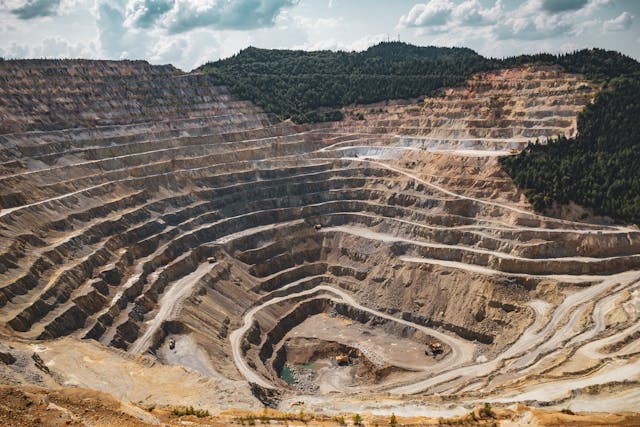The contemporary world stands at a crossroads of technological advancement and environmental consciousness. Rare earth elements (REEs) have become the cornerstones of numerous innovations, from clean energy solutions to powerful electronics. Yet, the extraction of these precious materials has often been linked with extensive environmental degradation. This calls for an immediate pivot towards sustainable REE mining, a practice that not only preserves the environment but also ensures long-term availability. A paradigm of this movement is Environmental New Elements, a Jordan-based company leading the charge in green mining. Samer Anis Mansour Mouasher, the Vice Executive Chairman, as the authority on the subject, shares his insight into the importance of sustainable mining of REEs and green mining in general.
1. Securing Future Supplies
The rare earth elements, a group of seventeen elements that nestle in the periodic table, are integral to a plethora of modern technologies. These range from neodymium magnets in wind turbines to the luminous phosphors in our digital screens and even the catalysts that help reduce emissions from vehicles. As we steer towards a future more reliant on renewable energy, electric vehicles, and advanced electronics, the demand for these minerals is expected to skyrocket. Sustainable mining practices are paramount in ensuring that we do not deplete these valuable resources. If mined recklessly, we risk not only running out of these elements but also jeopardizing the innovations that hinge on them. Sustainable practices, which focus on efficient extraction and reduced waste, guarantee that these resources remain available for the continuous growth and evolution of technological advancements.
2. Protecting Local Ecosystems
One of the most grievous consequences of traditional REE mining is its devastating impact on the environment. Traditional methods can lead to extensive deforestation, turning lush green lands into barren landscapes. The excavations can also result in soil contamination with heavy metals and radioactive materials, thereby jeopardizing the health of the soil and its ability to support life. Moreover, water sources near mining sites often bear the brunt of contamination, impacting not just aquatic life but also the communities relying on these water sources. Sustainable REE mining, on the other hand, is anchored in principles that prioritize the environment. By leveraging advanced technologies and methodologies, these practices minimize land disruption, ensure proper waste disposal, and safeguard water quality. This approach ensures that the local ecosystems — the plants, animals, and humans that call these areas home — are not just protected but also thrive alongside these mining ventures. Samer Anis Mansour Mouasher, who has been pushing for the protection of many green natural oases in Jordan, is most concerned about the impact of mining on the environment. Therefore, Environmental New Elements Company does all in its power to minimize the effect of the industry on the planet.
3. Reducing Carbon Footprint
Mining operations, traditionally, have been associated with significant greenhouse gas emissions, primarily due to the energy-intensive nature of the processes. From excavation to transportation and refinement, every step consumes vast amounts of energy, often sourced from fossil fuels. This contributes considerably to our global carbon footprint, exacerbating the challenges of climate change. Sustainable mining, however, emphasizes the integration of renewable energy sources, energy-efficient machinery, and optimized processes that reduce energy consumption. By doing so, sustainable mining operations significantly cut down on their CO2 emissions, helping the global community inch closer to its climate goals. In an era where industries are under scrutiny for their environmental impact, transitioning to sustainable mining practices represents a proactive step towards a cleaner, greener future.
4. Enhancing Social Acceptance and Legal Compliance
Mining operations, especially those involving rare earth elements, have sometimes been met with skepticism and opposition from local communities. This is often due to the potential environmental and health risks posed by traditional mining methods. Sustainable mining addresses these concerns head-on, employing practices that prioritize the safety and well-being of both the environment and the local populace. As a result, companies that adhere to sustainable practices often enjoy stronger relationships with local communities, fostering an atmosphere of trust and cooperation. Beyond the immediate community benefits, there's the broader landscape of global regulations and standards to consider. Many countries and international bodies are intensifying their environmental regulations, making sustainable mining not just an ethical choice but also a pragmatic one. Companies that have already embraced sustainable methods are likely to find themselves ahead of the curve, facing fewer legal hurdles and enjoying a reputation as industry pioneers.
5. Economic Longevity
While the initial shift to sustainable practices may come with its own set of challenges and investments, the long-term economic benefits are undeniable. Traditional mining operations can often face unforeseen costs — from environmental damage reparations to legal fines and even operational shutdowns due to community protests. Sustainable mining practices, by prioritizing eco-friendly and community-friendly operations, significantly mitigate these risks. Furthermore, as global demand for responsibly sourced materials grows, companies that provide sustainably mined rare earth elements may find themselves with a competitive advantage in the market. This means not only better profitability but also greater investor interest and funding opportunities. In essence, the economic future of the rare earth element industry seems inextricably linked with its ability to mine sustainably.
The significance of rare earth elements in our modern society cannot be understated. However, as we extract and utilize these resources, we carry a responsibility to ensure that our actions do not compromise the well-being of our planet. Sustainable rare earth element mining is not just a noble pursuit; it is an imperative. With individuals like Samer Anis Mansour Mouasher and companies like Environmental New Elements leading the way, there is hope that the industry will adopt practices that are in harmony with the environment.





Comments